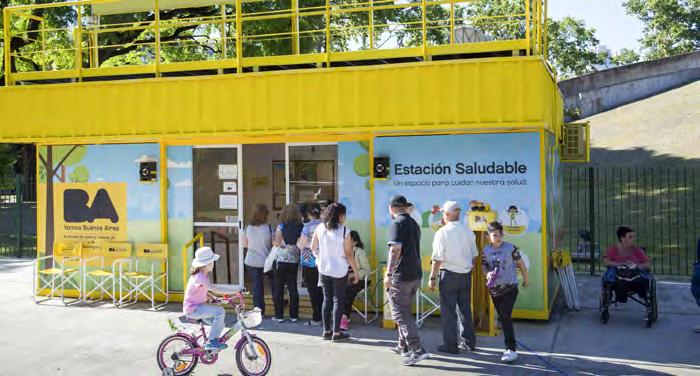
3 minute read
BUENOS AIRES, ARGENTINA
BUENOS AIRES – A GLOBAL ACTIVE CITY
As the first city in Latin America to be awarded Global Active City certification by the International Olympic Committee, Buenos Aires is committed to improving the health of its residents. During its quest to achieve Global Active City status, the city worked to promote citizens’ health in different spheres. Since 2016, the firstlevel public healthcare system has been reinforced with 45 primary healthcare centres and the public physical activity offer has been expanded as well. Between 2016 and 2018, the number of users of public sports facilities increased more than threefold after the infrastructure was upgraded. In 2018, lunch menus in public schools were improved with healthier food. Between 2017 and 2019, free training in sports science was provided to more than 7,000 health and physical activity practitioners. There has also been a significant increase in sustainable transport since the two-fold expansion of cycle lanes and the introduction of a free public bicycle service in 2019.
ALIGNMENT WITH THE CITY’S LONGTERM OBJECTIVES
The partnership with Cities Changing Diabetes stems from the alignment of the programme’s vision for bending the curve on diabetes with the city’s health objectives by reducing its biggest modifiable risk factor – obesity. In 2018, having signed an agreement with the Buenos Aires City Government, Cities Changing Diabetes took part in the Global Active City audit process.
HEALTHY STATIONS – NOW FOCUSED ON PREVENTION AND YOUNG PEOPLE
In addition, for the past eight years, a government department has been running the Estaciones Saludables (Healthy Stations) initiative. These stations, which are situated in popular public spaces such as parks and underground stations, offer free health checks and nutritional advice. Almost half the population of Buenos Aires – 1.2 million people – has used one of the 40 stations. Cities Changing Diabetes became involved in this initiative when it organised diabetes training for the 120 nurses and nutritionists who staff the stations. This training, which was conducted by the patient association Liga Argentina de Protección al Diabético (LAPDI), ensured that residents visiting the Healthy Stations would receive appropriate advice on diabetes prevention and care.
The Healthy Stations have been successful in reaching older residents. However, a significant proportion of the city’s schoolaged population is overweight, and so the authorities are looking at new ways to engage young people. As a result, some of the Healthy Stations are now hosting ‘healthy birthday parties’ and community orchards to promote healthy choices. The City Government, with input from Cities Changing Diabetes, also has plans to set up mobile cooking booths, where chefs will demonstrate how to shop for and prepare healthy food at two of the city’s busiest markets.
BUILDING A TOOL TO AID PHYSICAL ACTIVITY PROMOTION EFFORTS
In 2020, together with Liverpool John Moores University and the local university Universidad Favaloro, Cities Changing Diabetes will conduct research into physical activity among children and young people. This project aims to create a standardised physical activity assessment self-report tool that can be used by researchers and potentially support physical activity promotion efforts in schools.
Gobierno de la Ciudad de Buenos Aires (Government of the City of Buenos Aires)

Buenos Aires Ciudad Activa (Buenos Aires Active City)
Universidad Favaloro Instituto del Deporte Liga Argentina de Protección al Diabético (LAPDI) (Argentine diabetes patient association)
Liverpool John Moores University
“To meet the pressure and challenges brought by rapid growth and by the consequences of sedentary lifestyle, especially among children, we’ve come to realise the power of physical activity and sport when key players work together to deliver transformative programmes. The Buenos Aires Global Active City certification is a unique model that helps us to capture and meet the complexity of our task, with a focus on action, impact and continual improvement.”
Horacio Rodríguez Larreta, mayor of Buenos Aires, Argentina
IN BUENOS AIRES 40%
OF SCHOOLCHILDREN AGED 10–11 WERE OVERWEIGHT IN 201132
16%
OF ADULTS ARE LIVING WITH OBESITY33










